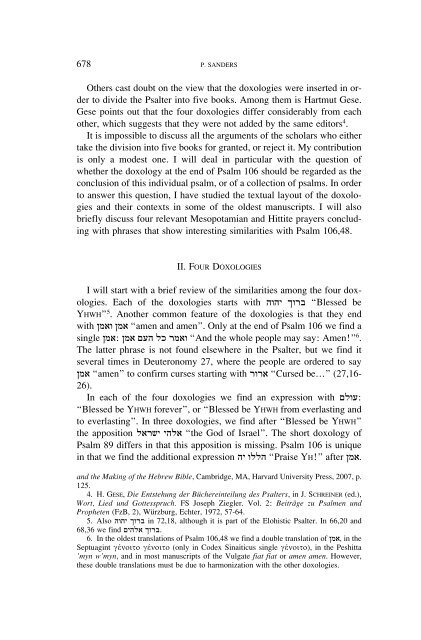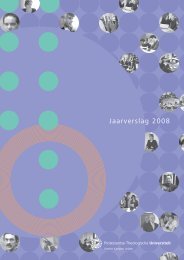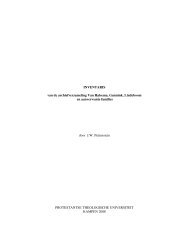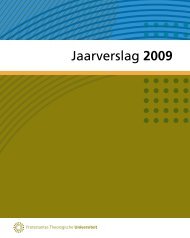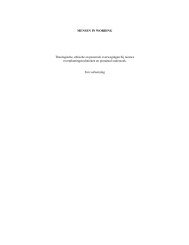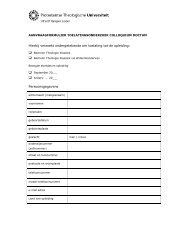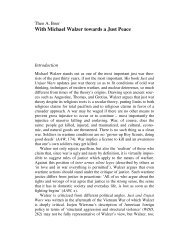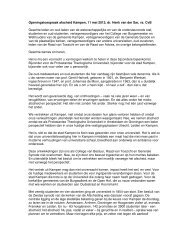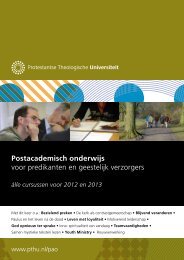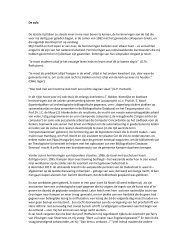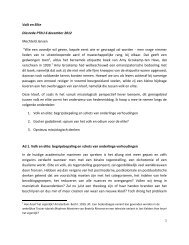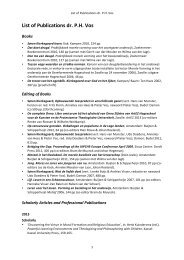the composition of the book of psalms - Protestantse Theologische ...
the composition of the book of psalms - Protestantse Theologische ...
the composition of the book of psalms - Protestantse Theologische ...
You also want an ePaper? Increase the reach of your titles
YUMPU automatically turns print PDFs into web optimized ePapers that Google loves.
678 P. SANDERSO<strong>the</strong>rs cast doubt on <strong>the</strong> view that <strong>the</strong> doxologies were inserted in orderto divide <strong>the</strong> Psalter into five <strong>book</strong>s. Among <strong>the</strong>m is Hartmut Gese.Gese points out that <strong>the</strong> four doxologies differ considerably from eacho<strong>the</strong>r, which suggests that <strong>the</strong>y were not added by <strong>the</strong> same editors 4 .It is impossible to discuss all <strong>the</strong> arguments <strong>of</strong> <strong>the</strong> scholars who ei<strong>the</strong>rtake <strong>the</strong> division into five <strong>book</strong>s for granted, or reject it. My contributionis only a modest one. I will deal in particular with <strong>the</strong> question <strong>of</strong>whe<strong>the</strong>r <strong>the</strong> doxology at <strong>the</strong> end <strong>of</strong> Psalm 106 should be regarded as <strong>the</strong>conclusion <strong>of</strong> this individual psalm, or <strong>of</strong> a collection <strong>of</strong> <strong>psalms</strong>. In orderto answer this question, I have studied <strong>the</strong> textual layout <strong>of</strong> <strong>the</strong> doxologiesand <strong>the</strong>ir contexts in some <strong>of</strong> <strong>the</strong> oldest manuscripts. I will alsobriefly discuss four relevant Mesopotamian and Hittite prayers concludingwith phrases that show interesting similarities with Psalm 106,48.II. FOUR DOXOLOGIESI will start with a brief review <strong>of</strong> <strong>the</strong> similarities among <strong>the</strong> four doxologies.Each <strong>of</strong> <strong>the</strong> doxologies starts with ברוך יהוה “Blessed beYHWH” 5 . Ano<strong>the</strong>r common feature <strong>of</strong> <strong>the</strong> doxologies is that <strong>the</strong>y endwith אמן ואמן “amen and amen”. Only at <strong>the</strong> end <strong>of</strong> Psalm 106 we find asingle ואמר כל העם אמן :אמן “And <strong>the</strong> whole people may say: Amen!” 6 .The latter phrase is not found elsewhere in <strong>the</strong> Psalter, but we find itseveral times in Deuteronomy 27, where <strong>the</strong> people are ordered to say(27,16- be…” “Cursed ארור “amen” to confirm curses starting with אמן26).:עולם In each <strong>of</strong> <strong>the</strong> four doxologies we find an expression with“Blessed be YHWH forever”, or “Blessed be YHWH from everlasting andto everlasting”. In three doxologies, we find after “Blessed be YHWH”<strong>the</strong> apposition אלהי ישראל “<strong>the</strong> God <strong>of</strong> Israel”. The short doxology <strong>of</strong>Psalm 89 differs in that this apposition is missing. Psalm 106 is unique.אמן “Praise YH!” after הללו יה in that we find <strong>the</strong> additional expressionand <strong>the</strong> Making <strong>of</strong> <strong>the</strong> Hebrew Bible, Cambridge, MA, Harvard University Press, 2007, p.125.4. H. GESE, Die Entstehung der Büchereinteilung des Psalters, in J. SCHREINER (ed.),Wort, Lied und Gottesspruch. FS Joseph Ziegler. Vol. 2: Beiträge zu Psalmen undPropheten (FzB, 2), Würzburg, Echter, 1972, 57-64.5. Also ברוך יהוה in 72,18, although it is part <strong>of</strong> <strong>the</strong> Elohistic Psalter. In 66,20 and.ברוך אלהים 68,36 we find6. In <strong>the</strong> oldest translations <strong>of</strong> Psalm 106,48 we find a double translation <strong>of</strong> ,אמן in <strong>the</strong>Septuagint génoito génoito (only in Codex Sinaiticus single génoito), in <strong>the</strong> Peshitta’myn w’myn, and in most manuscripts <strong>of</strong> <strong>the</strong> Vulgate fiat fiat or amen amen. However,<strong>the</strong>se double translations must be due to harmonization with <strong>the</strong> o<strong>the</strong>r doxologies.


